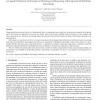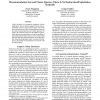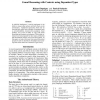1634 search results - page 32 / 327 » Reasoning about Knowledge Using Rough Sets |
FSKD
2008
Springer
13 years 10 months ago
2008
Springer
Evidence theory has been widely applied to uncertain reasoning. However, the evidence space and hypothesis space are each defined as a fixed set. If the theory is applied to solve...
CMPB
2010
13 years 7 months ago
2010
Ligand prediction has been driven by a fundamental desire to understand more about how biomolecules recognize their ligands and by the commercial imperative to develop new drugs. ...
CI
2004
13 years 8 months ago
2004
We present a general approach for representing and reasoning with sets of defaults in default logic, focussing on reasoning about preferences among sets of defaults. First, we con...
AAAI
2011
12 years 9 months ago
2011
Utility elicitation is an important component of many applications, such as decision support systems and recommender systems. Such systems query users about their preferences and ...
FLAIRS
2008
13 years 11 months ago
2008
In Artificial Intelligence, a crucial requirement is the ability to reason about actions and their effects on the environment. Traditional approaches which rely on classical logic...



